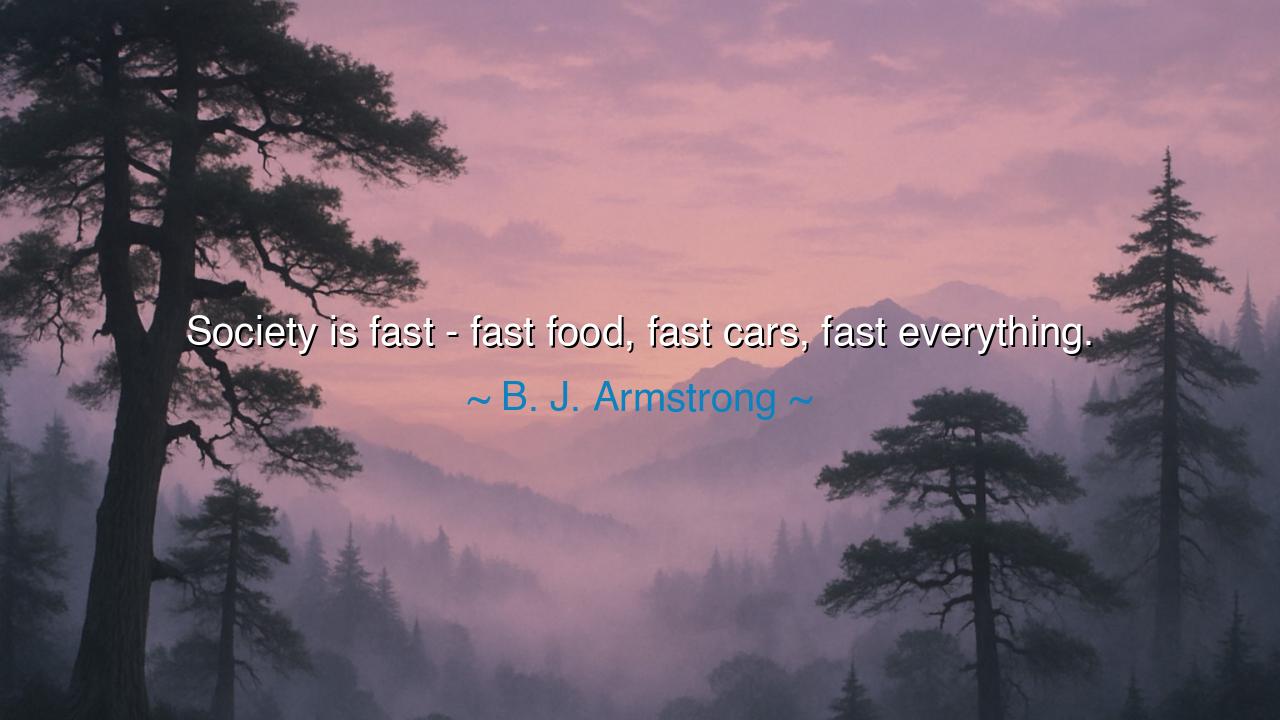
Society is fast - fast food, fast cars, fast everything.






Hear the words of B. J. Armstrong, once a player upon the courts of glory, who looked beyond the game and declared: “Society is fast – fast food, fast cars, fast everything.” In these words lies not only a description of our age, but a lament, and perhaps a warning. For he speaks of a world consumed by speed, a world where the pulse of life beats ever quicker, where patience is shunned, and where the hunger for immediacy drives men and women into restless pursuit of more and more.
In the ancient days, the rhythms of life were slower, set by the rising of the sun, the ripening of crops, the turning of the seasons. Wisdom grew like an oak tree, with deep roots and steady branches. But in the modern society Armstrong describes, the rhythm is no longer natural but mechanical. We demand fast food instead of meals slowly prepared with love, fast cars instead of journeys taken with reflection, fast entertainment, fast answers, fast success. And though the pace exhilarates, it also exhausts, leaving the soul gasping for stillness.
History teaches us the peril of unchecked speed. In the Industrial Revolution, machines roared to life, and men marveled at their new powers. Production was quickened, wealth increased, but the laborer was often crushed beneath the weight of unceasing work. Children toiled in factories, lungs filled with soot, lives shortened for the sake of haste. Progress came, yes—but at a terrible price. Armstrong’s words echo this eternal truth: when society worships speed above all, it risks losing sight of humanity itself.
Yet there is another side to this story. Speed has given us marvels: medicine delivered in moments, news shared across the world in seconds, the power to travel across continents in hours. Fast cars and technology have connected us, shortened distances, and made the impossible possible. Armstrong’s words do not despise these achievements; rather, they call us to awareness. For the question is not whether speed is good or evil, but whether we remain its masters, or whether we become its slaves.
Consider the athlete himself. A game of basketball is fast, filled with lightning passes, quick decisions, moments of brilliance. But behind the speed lies years of slow, steady practice: drills repeated thousands of times, muscles strengthened patiently, discipline forged over decades. Without slowness, the speed of the game would collapse into chaos. So too in life: fast everything cannot stand unless it is rooted in patience, discipline, and reflection.
The meaning of Armstrong’s lament is thus clear: society has embraced speed without balance, immediacy without depth. We devour without savoring, travel without seeing, live without pausing to breathe. And in doing so, we risk forgetting the beauty of slowness—the slow meal shared with friends, the slow walk under the stars, the slow shaping of character over time. To live only in haste is to live only on the surface.
The lesson, O listeners, is to reclaim rhythm. Use speed where it serves, but do not let it consume your life. When the world cries for haste, dare to slow down. Prepare a meal with care. Speak with patience. Build your dreams not only with ambition but with endurance. In this balance lies true strength, for the man who knows when to be fast and when to be slow is master of himself, while the one swept away by speed is but a leaf in the storm.
Therefore remember Armstrong’s words: “Society is fast – fast food, fast cars, fast everything.” Let them awaken you to the truth of your own days. Cherish what speed brings, but do not forsake the power of slowness. For only when we learn to balance the quick and the slow will society endure—not as a restless flame that burns out too soon, but as a steady fire that warms generations to come.






AAdministratorAdministrator
Welcome, honored guests. Please leave a comment, we will respond soon